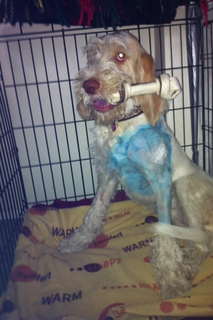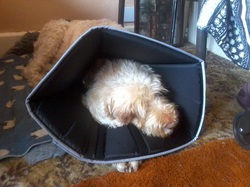Post-operative Care-tbd

Elsa, credit: Jane Louise Gill
When your dog returns home post-surgery you should keep them warm and comfortable by providing a soft clean bed, ideally in a quiet and draught free room at approximately 20-22°C. Because of their stitches they may find jumping onto furniture and climbing stairs difficult so place the bed close to the floor in a downstairs room. They will be very sleepy after their anaesthesia, especially if they have been under for a long time, so let them get as much rest as possible.
Unless your vet tells you otherwise, provide fresh clean water for your dog as usual. Prior to surgery, your dog will have been fasted or cleared out, so may be very hungry. Your dog may also feel a bit queasy after the anaesthetic and might well be sick, so keep their meals small and frequent initially. Easily tolerated foods such as cooked chicken (no bones) or tinned Chappie should be fed for the first couple of days after which time they should be ready to get back to their usual eating routine. If your dog has been administered or prescribed antibiotics it may be useful to feed them lacto-acidophilus or other probiotic capsules with their food to counteract any gastric distress caused by the medication.
It may take a few days for your dog to return to it's usual toilet routine, however if they show signs of serious diarrhoea or vomitting contact your vet immediately. It is normal for a dog to be a little constipated after surgery, this is nothing to worry about.
Sometimes during surgery their larynx can become aggravated and sore which may result in a mild cough which should be self-limiting and subside after a few days. Honey or Buttercup syrup can be administered to soothe the irritation if you like. If the cough worsens or is prolonged then contact your vet for advice.
Unless your vet tells you otherwise, provide fresh clean water for your dog as usual. Prior to surgery, your dog will have been fasted or cleared out, so may be very hungry. Your dog may also feel a bit queasy after the anaesthetic and might well be sick, so keep their meals small and frequent initially. Easily tolerated foods such as cooked chicken (no bones) or tinned Chappie should be fed for the first couple of days after which time they should be ready to get back to their usual eating routine. If your dog has been administered or prescribed antibiotics it may be useful to feed them lacto-acidophilus or other probiotic capsules with their food to counteract any gastric distress caused by the medication.
It may take a few days for your dog to return to it's usual toilet routine, however if they show signs of serious diarrhoea or vomitting contact your vet immediately. It is normal for a dog to be a little constipated after surgery, this is nothing to worry about.
Sometimes during surgery their larynx can become aggravated and sore which may result in a mild cough which should be self-limiting and subside after a few days. Honey or Buttercup syrup can be administered to soothe the irritation if you like. If the cough worsens or is prolonged then contact your vet for advice.
monitoring wound
TBD
chewing

Zeta, credit: Lesley Smith
TBD
exercise
TBD
